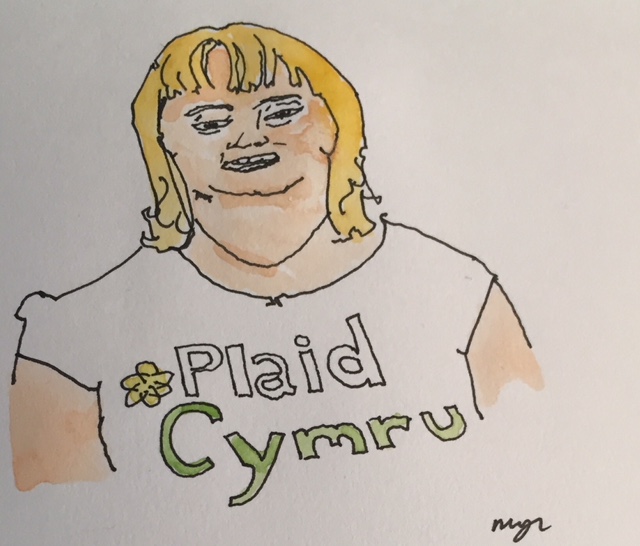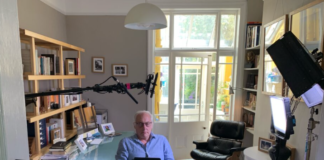- Rocket man - 2nd March 2026
- Death wish two - 2nd March 2026
- News to celebrate! - 1st March 2026
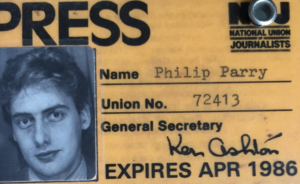 As the men’s football World Cup in Qatar continues, following Wales’ humiliating defeat against Iran, and amid growing anger that the woman in charge of BBC Cymru Wales (BBC CW) was to fly there, here our Editor Phil Parry looks at how these kind of stories have always been a mainstay for his journalism.
As the men’s football World Cup in Qatar continues, following Wales’ humiliating defeat against Iran, and amid growing anger that the woman in charge of BBC Cymru Wales (BBC CW) was to fly there, here our Editor Phil Parry looks at how these kind of stories have always been a mainstay for his journalism.
Earlier he described how he was assisted in breaking into the South Wales Echo office car when he was a cub reporter, the importance of experience in the job, and made clear that the ‘calls’ to emergency services as well as court cases are central to any media operation.
 He has also explored how poorly paid most journalism is when trainee reporters had to live in squalid flats, the vital role of expenses, and about one of his most important stories on the now-scrapped 53 year-old BBC Wales TV Current Affairs series, Week In Week Out (WIWO), which won an award even after it was axed, long after his career really took off.
He has also explored how poorly paid most journalism is when trainee reporters had to live in squalid flats, the vital role of expenses, and about one of his most important stories on the now-scrapped 53 year-old BBC Wales TV Current Affairs series, Week In Week Out (WIWO), which won an award even after it was axed, long after his career really took off.
Phil has explained too how crucial it is actually to speak to people, the virtue of speed as well as accuracy, why knowledge of ‘history’ is vital, how certain material was removed from TV Current Affairs programmes when secret cameras had to be used, and some of those he has interviewed.
He has disclosed as well why investigative journalism is needed now more than ever although others have different opinions, how the coronavirus (Covid-19) lockdown played havoc with media schedules, and the importance of the hugely lower average age of some political leaders compared with when he started reporting.

Controversies are meat and drink to journalists, especially investigative ones like me.
For example, it has been revealed that the headline-grabbing ‘Director of Content and Services’ Rhuanedd Richards, at BBC Cymru Wales (BBC CW) (a former Chief Executive of Welsh nationalist party Plaid Cymru [PC]), was flying out to Qatar, but this has prompted fury among some in her audience.
One aggrieved listener to BBC Radio Wales (RW) told me: “I have just tuned in to Radio Wales to hear the aftermath (of the Wales v Iran match, which was ignominiously lost) and Owen Money confessed he spent time with Rhuanedd Richards watching the game. He also revealed she is flying out to Qatar tomorrow no doubt at the taxpayer licence payers expense.”
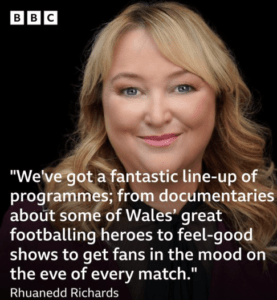 We have no way of knowing whether this was, in fact, a private visit that Mr Money highlighted, or if it was, as the furious listener says, funded by the licence fee-payer, but either way it may be the focus of anger. If this was a ‘work’ trip to Qatar, then it might be viewed as a ‘jolly’, paid by a single mum in Rhyl. If this was a private journey, then it could be seen by some in her audience, as showing bias when the news service she oversees is meant to be neutral, and effectively endorsing a contentious regime where homosexuality is illegal, huge numbers of migrant workers have died building stadiums for the World Cup, and there are allegations of corruption in securing the tournament in the first place.
We have no way of knowing whether this was, in fact, a private visit that Mr Money highlighted, or if it was, as the furious listener says, funded by the licence fee-payer, but either way it may be the focus of anger. If this was a ‘work’ trip to Qatar, then it might be viewed as a ‘jolly’, paid by a single mum in Rhyl. If this was a private journey, then it could be seen by some in her audience, as showing bias when the news service she oversees is meant to be neutral, and effectively endorsing a contentious regime where homosexuality is illegal, huge numbers of migrant workers have died building stadiums for the World Cup, and there are allegations of corruption in securing the tournament in the first place.
Let’s concentrate on this controversy.
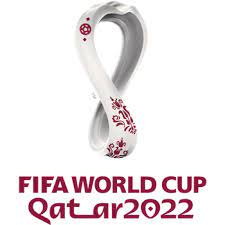
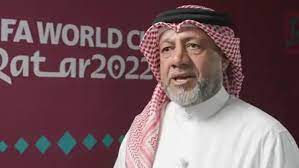
Terrible remarks from Khalid Salman, a retired football star from Qatar, and ambassador for the football World Cup, have underscored the outrageous facts that gay people there may endure a punishment of up to three years in prison, as well as knowing they might face the death penalty under sharia law if they are Muslim.
He used an Arabic term for being homosexual meaning that it was a “damage in the mind”, speaking on the German public broadcaster ZDF. Mr Salman also appallingly said that gay people were bringing in to Qatar something that was “not good”, and he was worried children in his country might see gay men and women. He was then swiftly cut off by a media adviser.
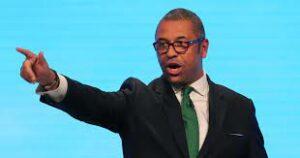
This medieval approach to being gay in Qatar caused a huge storm, with remarks from politicians adding to it.
The Foreign Secretary, James Cleverly said even before them, that fans should be: “Respectful of the host nation” (which has a TINY population of just 2.9 million people, but with an estimated 1.7 million migrant workers). However Lucy Powell the Shadow Culture Secretary declared: “This is shockingly tone deaf from James Cleverly”.

Under the headline: Why Qatar makes this football fan so uneasy”, The Times columnist David Aaronovitch stated: “…it is effectively a monarchical dictatorship”, as well as: “…I wouldn’t dream of going (to Qatar). Even watching from afar feels horribly like collusion. It’s all a bit sad”.
Others though, HAVE gone to Qatar, but for reasons other than those held by Ms Richards – to protest about its severe laws. The Lesbian, Gay, Bisexual and Transgender (LGBT) campaigner Peter Tatchell demonstrated against them in its capital Doha, where he held up a placard which said: “Qatar arrests, jails and subjects LGBTs to ‘conversion’”.
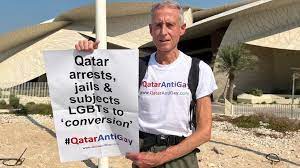
This awful situation may be connected to it emerging that Prince William was not to travel to the country (unlike Ms Richards), even though he is President of the Football Association (FA).
Earlier this year, under the headline ‘DOCTOR BECOMES ‘FIRST’ QATARI TO PUBLICLY COME OUT AS GAY’ The Independent reported that Nas Mohammed said: “I walked into a gay club and I knew I was 100 per cent gay. I went home and cried – I thought my life is in crisis. I thought I was going to go to hell, my life is damned”.

One leading Welsh football presenter, told me: “A producer I work with is gay and he can’t go!”.
Even the former president of football governing body, FIFA, (Sepp Blatter), appears now to have reversed his position, and says the decision to award the World Cup to Qatar was a “mistake”. We are told this is to do with the size of the country, and not connected to human rights abuses, but his comments will only add to the dreadful headlines about Qatar.


Mr Blatter’s change of heart came, as 10 European football associations (including those of England and Wales) announced: “human rights are universal and apply everywhere”.
Peaceful protests were planned by some players, while England’s Harry Kane and nine other captains of European teams (among them the Wales captain Gareth Bale) were to be wearing ‘One Love’ armbands to promote diversity and inclusion. But it was decided NOT to wear them after a threat from FIFA that captains could face an instant yellow card for doing so.
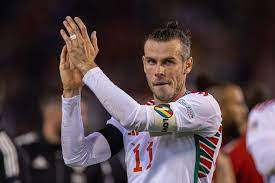
“FIFA has been very clear that it will impose sporting sanctions if our captains wear the armbands on the field of play“, a joint statement from the Football Associations of England, Wales, Belgium, Denmark, Germany, The Netherlands and Switzerland said.
“We are very frustrated by the FIFA decision which we believe is unprecedented – we wrote to FIFA in September informing them of our wish to wear the One Love armband to actively support inclusion in football, and had no response”, the statement added.
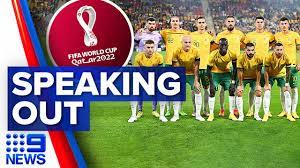
Denmark were donning ‘toned-down’ shirts in protest, with kit provider Hummel saying it did “not wish to be visible”, while Australia’s squad released a video urging Qatar to abolish its laws banning same-sex relationships.
This is all set against intense criticism of Qatar’s human rights record generally, as well as the background to the World Cup there, and puts further question marks over Ms Richards’ visit, as mentioned by Mr Money.
The Sunday Times, disclosed that the country had secretly offered £400 million to FIFA, just 21 days before being awarded the tournament, and once the announcement was made, more alarm bells started to ring.
The country is slightly smaller than Connecticut and has scant soccer pedigree, but in December 2010 the tournament was awarded to it even so during a bidding process that, according to American authorities, was riddled with corruption.
Two excellent recent books have laid bare in horrifying detail the darker side of life inside Qatar, and it has used the World Cup as a form of ‘soft power’, to boost the profile of the state, but there are serious doubts about the way this has been done.
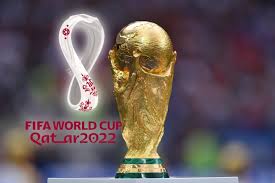
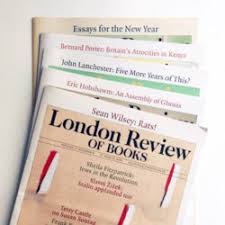
They are: ‘Hidden Stories From One of the Richest Nations on Earth’ by John McManus, as well as ‘Qatar and the 2022 FIFA World Cup : ‘Politics, Controversy, Change’ by Paul Michael Brannagan and Danyel Reiche.
I’ll let the London Review of Books (LRB), which featured them, take up the story: “Homosexuality is illegal in Qatar, and though the organisers of the World Cup have insisted that everyone is welcome it remains to be seen how public demonstrations of same-sex affection will be handled; earlier this year one of the men in charge of security at the tournament Major General Abdulaziz Abdullah al-Ansari, warned that rainbow flags may be taken from fans for their own protection”.
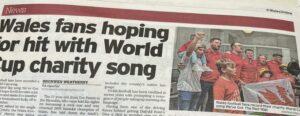
Despite everything, we were urged to celebrate Wales’ qualification (which is perhaps why Mr Money said Ms Richards was going). We were told, for instance, that Welsh football fans recorded a charity song to mark the occasion.
The Cardiff-based newspaper South Wales Echo (SWE), and website version WalesOnline (WO) were particular cheerleaders, and they ‘reported’: “Those behind the song We’ve Got The Red Wall hope it will become a hit on the terraces and make it to number one before the tournament kicks off in Qatar in November”.
The conditions for migrant workers in building the stadiums for it, have been highly controversial too.
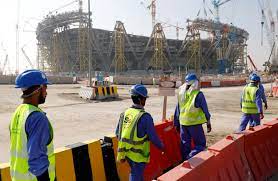
The appalling heat and shocking environment have led, it’s claimed, to THOUSANDS of deaths. The Qatari authorities vigorously dispute the high number, and say only fifty have died. But the respected Non-Governmental Organisation (NGO) (Human Rights Watch [HRW]), say it is true.
What is certainly the case, though, is that Qatar detained and then deported dozens of migrant workers who were protesting about the circumstances of their work. HRW declared: “These are the people who have literally built the World Cup from the ground up, from the desert up. They are the ones who must receive financial compensation before the first ball is kicked”.
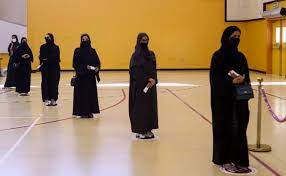
Ms Richards may also know that life for a Qatari woman is VERY different from hers.
Most must be veiled, and women need the permission of a ‘guardian’, usually a father or brother, to marry, get a government job, or to apply for a university scholarship.
The absurd jubilations for qualifying were not confined to English-language media, either. The Welsh-language magazine Golwg produced a wall chart, showing the teams in each group, and the progress that must be made to reach the World Cup final.
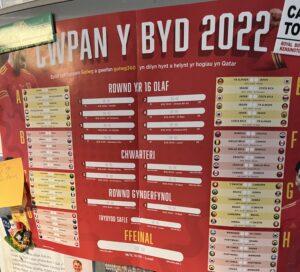
Surely, though, human rights come first, and Welsh pride at reaching a major tournament, comes second?!
I here quote a key passage of the BBC Editorial Guidelines which may be relevant in this context (and which Ms Richards, presumably, knows well): “We must always scrutinise arguments, question consensus and hold power to account with consistency and due impartiality”.
This sits uneasily with one of the corporation’s senior executives showing her support for a team in a country where women are second-class citizens, it is illegal to be gay, and a lot of migrant workers have been killed building the support structure she will enjoy…

Phil’s memories of his remarkable 39-year long award-winning career in journalism as he was gripped by the incurable neurological disabling condition Hereditary Spastic Paraplegia (HSP), have been released in a major book (including stories about looking behind the headlines of big football events) ‘A GOOD STORY’. Order the book now!
Regrettably publication of another book, however, was refused, because it was to have included names.

Tomorrow – how Wales’ match in Qatar puts centre stage controversies about a brass band run by Welsh football fans, which has been accused of blasting out anti-English messages in a row over a £17,000 taxpayer grant, and declared about a UK Government minister, “Go fuck yourself you Tory bastard“.










